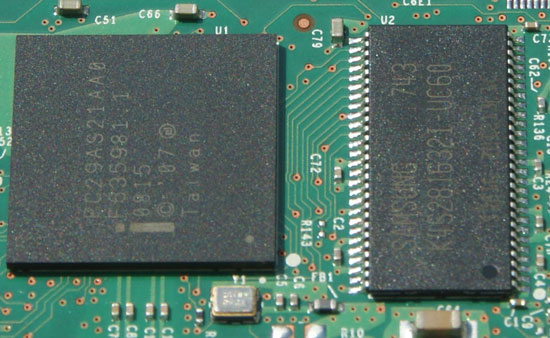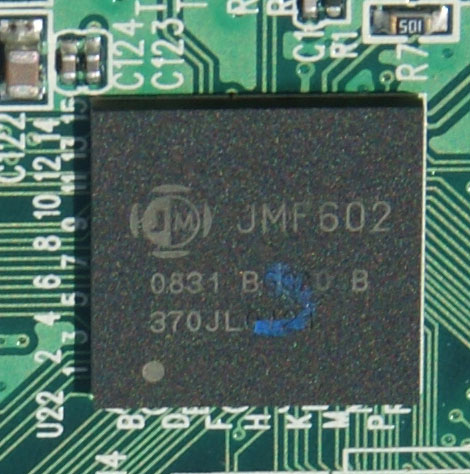Intel X25-M SSD: Intel Delivers One of the World's Fastest Drives
by Anand Lal Shimpi on September 8, 2008 4:00 PM EST- Posted in
- Storage
A Lack of DRAM or a Lack of Cache?
The high latency random write issue is annoying enough that it'd force me not to recommend any of the non-Intel MLC drives on the market today, regardless of how attractive their pricing may be. High performance with caveats isn't exactly high performance to me.

Intel's controller (left) + DRAM (right)
That being said, the root of the problem is still unknown. My first thought was that it was because the MLC drives had no DRAM buffer, and if you'll notice, Intel's MLC drive does have a DRAM buffer. I asked Intel about this and it turns out that the DRAM on the Intel drive isn't used for user data because of the risk of data loss, instead it is used as memory by the Intel SATA/flash controller for deciding exactly where to write data (I'm assuming for the wear leveling/reliability algorithms). Despite the presence of the external DRAM, both the Intel controller and the JMicron rely on internal buffers to cache accesses to the SSD.

Finding good data on the JMicron JMF602 controller is nearly impossible, but from what I've heard it's got 16KB of on-chip memory for read/write requests. By comparison, Intel's controller has a 256KB SRAM on-die. And I'm going to go out on a limb and assume that given Intel's experience with CPU caches, that its SRAM implementation is probably very well done.
With the JMicron based solutions, if you try and write too much to the drive (and trust me, it won’t take a lot) and the buffers get full, the controller tells the system that it’s not ready to write more data and you get a pause.
When you cause the JM602’s internal buffer to overflow, your system runs in bullet-time. Applications take much longer to launch and close, windows take longer to appear, and there are distinct pauses in anything you want to do that involves the disk. Want to send an IM? Well, that writes to an IM log - you can expect a pause before you can send your IM. Loading webpages is the worst, reading from and writing to the cache wreaks havoc on these cacheless MLC drives. Just for kicks I tried loading AnandTech while I was extracting a 5GB file on the SuperTalent 60GB MLC, it took over 10 seconds for the website to load. Once the JM602 was free to fulfill the read request, the website just popped up - but until then it was like my DNS was failing. It’s a lot like what happens to your notebook if you try and do too much, the disk quickly becomes a bottleneck.
Thankfully, as we've already seen, this problem is only limited to JMF602 based MLC drives. The SLC drives and the Intel MLC are totally fine, so while I'll include these problematic MLC drives in today's comparison, let me state now that I would not purchase one.
JMicron's roadmap shows a new controller next year with an integrated ARM core as well as support for external DRAM, which could alleviate these problems, but until now the controller, and drives based on it, aren't worth it. You get a much better overall experience out of a conventional mechanical disk drive, and much better performance from the Intel SSD or any of the SLC solutions on the market.
The Test
| CPU: | Intel Core 2 Quad Q9450 (2.66GHz) |
| Motherboard: | Intel DG45ID |
| Chipset: | Intel G45 |
| Chipset Drivers: | Intel 8.1.1.1010 (Intel) |
| Memory: | Corsair XMS2-8500 1066 |
| Video Card: | VisionTek Radeon HD 4850 |
| OS: | Windows Vista Ultimate 32-bit |










96 Comments
View All Comments
aeternitas - Thursday, September 11, 2008 - link
Wow.#1 Meaning; Great read.
#2 Meaning; Why do you not use World of Warcraft in your testings more? This game still has huge system requirements on absolute full settings in crouded areas. No one is getting 60fps in that game in Shatt on a saterday night 16xAA/AF full distance view. Everything maxed running a high resolution. Also, the disk access of this game may not be as much as Crysis, but its far FAR more prolonged as people play this game for a matter of years, instead of a handfull of months tops.
hoohoo - Wednesday, September 10, 2008 - link
What?! Google Chrome Launch Time? Is this a new benchmark? The world was waiting for that test I can tell ya! Did Google slip a little something in your pocket?Ph0b0s - Wednesday, September 10, 2008 - link
Sorry if this repeats what anyone else has said, but I think this is the best harddisk review I have seen. All the other hdd reviews I have read though, all go into detail about how many mb/s the drive can transfer and what the access time is, I/O performance etc. This is all very nice, but all we really care about is how does the hdd perform in real world apps and games in comparision to other drives. How much faster is my browser going to load.And that is why I was so impressed with this review. I realise it probably took more time to create this review, but it was well worth it. You can see how much the drives in the comparision compare to the amount of money you will spend instead of having to extrapolate from throughput benchmarks.
I would feel a lot more confident in putting down money on the X25 after this review. Because I can see what the benefit I would get after in comparsion to other drives. Though the X25 needs to be another $100 dollars cheaper...
Anyway, please more hdd reviews like this...
bruto - Wednesday, September 10, 2008 - link
Anand, could you please post map load times for R6 Vegas 2 usingthese drives?
That game was killing me, and I'd like to know just how much
happiness is around the corner :)
FFFFFF - Tuesday, September 9, 2008 - link
I am very familiar with the tech works of SSDs and it is interesting to know of the security risk that involves the technology. http://www.techworld.com/SECURITY/NEWS/index.cfm?n...">http://www.techworld.com/SECURITY/NEWS/...cfm?news...This is one reason why I am not going to upgrade to SSD just yet till they figure out a more secure encryption.
cokelight - Tuesday, September 9, 2008 - link
RE: PLEASE LEARN HOW TO USE COMMAS! by ggordonliddy, 19 hours agoYou are just making it clear that you do not have a firm grasp of English. You are afraid of those who criticize poor grammar, because you know that you yourself will be exposed for the fraudulent pustule that lies beneath your slimy veneer.
I have a life. I'm just sick of illiterate authors. Just because it is a tech site is no excuse for extremely poor writing skills. I'm talking about skills that should be completely mastered before being allowed to graduate from elementary school.
^
Take your elitism elsewhere. If you actually practiced what you preached then you'd note your own comma abuse:
"You are afraid of those who criticize poor grammar, because you know that you yourself will be exposed for the fraudulent pustule that lies beneath your slimy veneer."
The second clause is dependent. Therefore, it does not necessitate a comma.
aeternitas - Thursday, September 11, 2008 - link
Use the reply link.xenon83 - Tuesday, September 9, 2008 - link
"Do keep in mind though, the numbers we're talking about here are ridiculously low - even 900 µs to write to MLC flash is much faster than writing to a mechanical hard disk."But when it comes to random writes ssd's in general - this intel ssd included - fails miserably.
http://www.alternativerecursion.info/?p=106">http://www.alternativerecursion.info/?p=106
johncl - Wednesday, September 10, 2008 - link
Yes as the other poster say, the Intel drive have solved the issues with small random writes that the OZC and other MLC drives so far have been suffering from. If you read the whole article thoroughly you will see that clearly.Lets hope OCZ can come up with a better controller in their next generation MLC SSDs. We really need the competition here to bring those prices down, the Intel drive is a tad too expensive atm imo.
balotz - Tuesday, September 9, 2008 - link
Random writes are exactly as fast as sequential writes on this Intel SSD (10,000 random 4k writes per second).The article you referenced uses data from an SSD which appears to suffer from issues relating to the JMicron controller.
The Intel SSD is obviously not affected, this is clearly shown by the numbers in this very review!